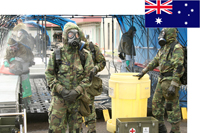Chemical Storage Guidelines and Regulations
Is your company in compliance with the various Federal regulations and guidelines that govern the way hazardous chemicals must be stored?
In the interest of helping our customers to select the right products to ensure the safe storage and transfer of hazardous chemicals and other flammable or combustible materials, Interstate Products has provided below a summary of information and links to relevant Federal compliance resource publications to help you better understand the basic principles, guidelines and regulatory rules that must be followed.
Many of the regulations and guidelines presented below have been widely adopted by most US states, however, it is also important to learn which state laws apply specifically to your industry, company or particular application. Our customers are encouraged to seek out the relevant agencies involved in these types of regulations and guidelines in the states in which they operate.
Chemical Storage Regulations
Hazardous chemicals should be separated and stored in locked safety storage cabinets within a central chemical storage area. Federal regulations, state laws, and even insurance companies may dictate how hazardous chemicals must be stored. Below is a brief summary of specific chemical storage regulations and guidelines. Links to specific resources are provided for the purpose of reviewing the regulations in more detail. Regulations on chemical storage have been sourced from the Environmental Protection Agency (EPA), The Uniform Fire Code (UFC), The National Fire Protection Association (NFPA), and the Occupational Health and Safety Administration (OSHA).
Segregated Chemical Storage - Corrosives (Acids and Bases)
Corrosive and flammable liquids should never be stored together.
OSHA Regulations
OSHA 1910.1450
"Bottles of corrosive liquids should be stored in acid containers... To ensure that mutually reactive chemicals cannot accidentally contact one another, such substances should be stored in corrosion-resistant secondary containers."
The Uniform Fire Code (UFC)
Uniform Fire Code. UFC 80.301 (n):
"Storage of incompatible hazardous materials shall be separated. Separation shall be accomplished by ... Storing hazardous materials in storage cabinets ... Materials which are incompatible shall not be stored within the same cabinet."
The National Fire Protection Association (NFPA)
National Fire Protection Association Comments following section 4-3.1:
"Finally, it must be remembered that these cabinets are designed and constructed for flammable and combustible liquid storage only... incompatible materials, whether liquid or solid, should not be stored in these cabinets."
EPA Regulations
EPA's emergency management activities and regulations help protect the environment and human health from releases or discharges of oil, chemicals, or other hazardous substances. Because each hazardous substance has its own properties and behaviors, the potential for exposure and the nature of the effects vary widely. For more information on Chemicals and Hazardous Substances, visit: http://www.epa.gov/emergencies/content/learning/substances.htm



